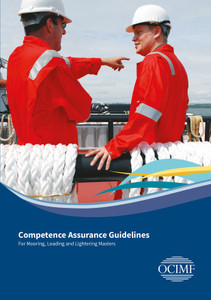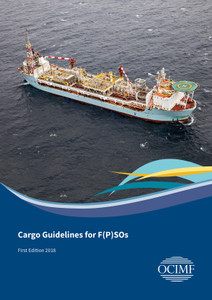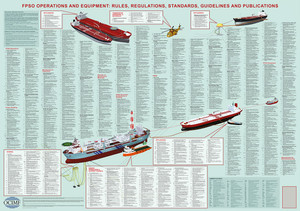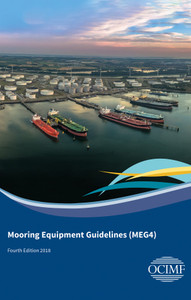
This publication sets out the basic skills and knowledge requirements for safe operation of F(P)SO installations and the training and assessment of F(P)SO personnel to meet them. It has been produced by OCIMF in cooperation with the Marine Safety Sub-Committee of The International Association of Oil and Gas Procedures (OGP) and with OGP’s endorsement.
This publication provides guidelines to assist F(P)SO Managers in achieving and maintaining the highest practical standards of competence for F(P)SO operations personnel. The guidelines are installation specific, not company generic. This means that if a company has multiple F(P)SOs then the whole range of activities will need to be carried out for each unit.
The purpose of this guide is to enable F(P)SO Managers to:
- Develop an effective Competency Assurance Program
- Develop a concept for competency assessment that meets each company's needs based upon their own site organisation structure
- Determine the competencies required for each Level of F(P)SO personnel
- Assess the competence of each member of the F(P)SO operations personnel
- Assist establish the training needs for each member of the F(P)SO personnel
- Establish the required experience and knowledge for safe operations, based upon the Competency Assessment Tables.
This document is a guide to establishing the basic skills and knowledge requirements to safely operate F(P)SO installations and the training and competence assessment of F(P)SO personnel. It has been produced in cooperation with the Marine Safety Sub- Committee of The International Association of Oil and Gas Producers (OGP), and is endorsed by them.
It provides guidelines designed to assist F(P)SO managers in achieving and maintaining the highest practical standards of competence for F(P)SO operations personnel.
It should be noted that this guide does not relate to the crew of trading tankers, gas carriers or standby vessels as STCW 95 provides coverage for all aspects of competence for those operations. F(P)SO designed to disconnect from the mooring system due to severe weather conditions need, when off station, to meet the requirements of MARPOL, SOLAS and other appropriate IMO conventions as defined by the Flag State. F(P)SO operators are recommended to address the navigational readiness of these units following the guidance provided by these guidelines.
The guidelines are installation specific, not company generic. This means that if a company has multiple F(P)SOs the whole range of activities will need to be carried out for each unit.
The purpose of this guide is to enable F(P)SO managers to:
- Develop an effective Competency Assurance Program as an essential tool for successful operations
- develop a concept for competence assessment that meets each individual company’s needs, based upon their own site organisation structure
- determine the competencies they require for each Level of F(P)SO personnel
- assess the competence of each member of their F(P)SO operations personnel
- assist establish the training needs for each member of the F(P)SO personnel
- establish the required experience and knowledge for safe operations based upon the Competence Assessment tables.
It is recommended that every member of the F(P)SO operations personnel should be required to provide evidence of having acquired the necessary knowledge and practical skills in accordance with the competence assessment procedures described in these Guidelines.
It is important that adequate training is provided for F(P)SO operations personnel whenever requirements for further training are identified.
The advice provided in these Guidelines is subject to any international and national regulations with regard to the training and/ or certification of F(P)SO personnel. The F(P)SO Manager and others concerned with the implementation of these Guidelines, should be aware of such requirements.
These F(P)SO Competence Assessment Guidelines cover:
- Guidance and advice on the development and implementation of the training and assessment program for F(P)SO personnel
- outlines of a ‘Functional Analysis’ that describes the majority of F(P)SO operational tasks (referred to as elements) in terms of personnel skill and knowledge
- a set of ‘Competence Assessment Tables’ that provide an outline of the competency and knowledge requirements for each operational element
- an example of a ‘Competence Record Book’ that can be developed further to document and record the development of each individual member of F(P)SO personnel.
The effectiveness of the Competency Assurance Program is confirmed when personnel can successfully handle normal, abnormal and emergency conditions as verified through work place and personal assessment by qualified Assessors and Verifiers.
Section 1 - Implementation Guidelines
1.1 General
1.2 Getting Started
1.3 F(P)SO Personnel and Competency Levels
1.4 Customising and the Guidelines
1.5 Responsibilities Ownership and Stewardship
Section 2 - Functional Analysis
2.1 Index of Functions, Units and Elements
2.2 Analysis Tree
Section 3 - Assessors and Verifiers
3.1 Appointment and Training of Assessors
3.2 Appointment and Training of Verifiers
Section 4 - Criticality Assessment
4.1 General
4.2 Performing a Criticality Assessment
4.3 Criticality Assessment
Section 5 - Competence Assessment Tables
5.1 General Principle
5.2 Developing Competency Assessment Tables
5.3 Verification and Approval
5.4 Revalidation Process
5.5 Overview
Section 6 - Assessment Guidance
6.1 General
6.2 Observation
6.3 Questioning
6.4 Written Test
6.5 Oral Test
6.6 Assessment Expertise
6.7 Records
6.8 Overview
Section 7 - Competence Record Book
7.1 Overview Model Competence Record Book
7.2 Record Sheets
Section 8 - Training Guidance
8.1 General
8.2 Determining Individual’s Training Needs
8.3 Training Strategy
8.4 Overview
Appendix 1 - Model Competence Record Book
Appendix 2 - Worked example of Criticality Assessment
Appendix 3 - CATs (Competence Assessment Tables)
System 1 - Produced Fluid Inlet
System 2 - Fluid Separation
System 3 - Gas Handling
System 4 - Produced Water Injection
System 5 - Well Test Measurement
System 6 - Auxiliary Systems
System 7 - Emergency Situations/Personnel Safety
System 8 - Ballast System
System 9 - Navigation Systems
System 10 - Corrosion Systems
System 11 - Hydrocarbon Systems
System 12 - Export Systems
The Oil Companies International Marine Forum (OCIMF) is a voluntary association of oil companies with an interest in the shipment and terminalling of crude oil, oil products, petrochemicals and gas. OCIMF focuses exclusively on preventing harm to people and the environment by promoting best practice in the design, construction and operation of tankers, barges and offshore vessels and their interfaces with terminals. Learn more at www.ocimf.org
- Number of Pages:
- 88
- ISBN:
- 9781905331345
- Published Date:
- January 2009
- Binding Format:
- Hardback Spiro
- Book Height:
- 300 mm
- Book Width:
- 210 mm
- Weight:
- 0.8 kg
- Author:
Oil Companies International Marine Forum
- Preview:
- Yes






